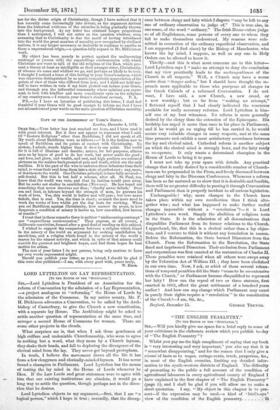LORD LYTTELTON ON LAY REPRESENTATION.
(TO THE Emma OF THE "SPECTATOR."] 'Sue,—Lord Lyttelton is President of an Association for the reform of Convocation by the admission of a Lay Representation, —a project analogous to " reforming " the House of Lords by the admission of the Commons. In my native county, Mr. F. H. Dickinson advocates a Convention, to be called by the Arch- bishop of Canterbury, to give the Church a new constitution, with a separate lay House. The Archbishop might be asked to settle another question of representation at the same time, and octroyer a second House of Commons for women. There are some other projects in the clouds.
What surprises me is, that when I ask these gentlemen of -high curare and undeniable Churchmanship, who seem to agree in nothing but a word, what they mean by a Church layman, they shake their heads, and fall to deploring the divergence of the clerical mind from the lay. They never get beyond protoplasm.
In truth, I believe the movement draws all the life it has from a few clergymen and clerically-minded laymen. It has never found a champion in Parliament. Lord Lyttelton has the means of testing the lay mind in the House of Lords whenever he likes. If the Law Lords and great statesmen were to agree with him that our existing institutions are obsolete, it would go a long way to settle the question, though perhaps not in the direc- tion that he desires.
Lord Lyttelton objects to my argument,—first, that I am " a logical person," which I hope is true ; secondly, that the diverg-
epee between clergy and laity which I dispute "may be left to any one of ordinary observation to judge of." This is true also, in one sense, of the word " ordinary." The Irish Home-rulers judge so of all Englishmen, some persons of every one to whom they fail to make themselves understood. My reasons were sub- mitted in correction of the ordinary superficial observation, and I am supported (I find since) by the Bishop of Manchester, who knows the lay mind, I suppose, as well as any one in Holy Orders can be allowed to know it.
Thirdly—and this is what most concerns me in this letter— Lord Lyttelton says I " make no attempt to deny the conclusion that my view practically leads to the unchangeableness of the Church in all respects." Well, a Church may have a worse motto than " Semper eadem," but I should have thought the re- proach more applicable to those who postpone all changes to the Greek Calends of a reformed Convocation. I do not want, I have said, a new Church, a new creed, or a new worship ; but so far from "making no attempt," I flattered myself that .I had clearly indicated the resources available for really necessary reforms. Lord Lyttelton is him- self one of my best witnesses. No reform is more generally desired by the clergy than the extension of the Episcopate. His lordship has urged it more than once in his place in Parliament, and if he would go on urging till he has carried it, he would secure very valuable changes in many respects, and at the same time promote and exhibit a most satisfactory accordance between the lay and clerical mind. Cathedral reform is another subject on which the clerical mind is strongly bent, and the laity ready to co-operate. It only wants a determined champion in the House of Lords to bring it to pass.
I must not take up your space with details. Any practical change that is really desired by a considerable number of Church- men can be propounded in the Press, and freely discussed between clergy and laity in the Diocesan Conferences. Whenever a reform has been so far matured as to show that it is desirable and feasible, there will be no greater difficulty in passing it through Convocation and Parliament than is properly incident to all serious legislation.
Unchangeable ! why, more changes in the Church have taken place within my own recollection than I think alto- gether wise ; and what has happened to make further useful changes impossible without a " revolution "?— it is Lord Lyttelton's own word. Simply the abolition of religious tests in the State. It is the admission of all denominations that disqualifies Parliament from its former relations to the Church. I apprehend, Sir, that this is a clerical rather than a lay objec- tion, and I venture to think it without any foundation in reason. Before. the Reformation, the State burned Dissenters from the Church. From the Reformation to the Revolution, the State fined and imprisoned Dissenters. Their exclusion from Parliament and corporations was first enacted at the restoration of Charles IL These penalties were retained when all others were swept away by the Toleration Act of William III. ; they have been abolished in our own time. Now, I ask, at which of these several relaxa- tions of temporal penalties did the State "cease to be co-extensive with the Church," or Parliament become disqualified to represent her laity? How can the repeal of two or three statutes, first enacted in 1662, affect the great settlement of a hundred years earlier ? And how can any change which Parliament may enact in purely State rights require a " revolution " in the constitution of the Church ?—I am, Sir, &c.,


































 Previous page
Previous page